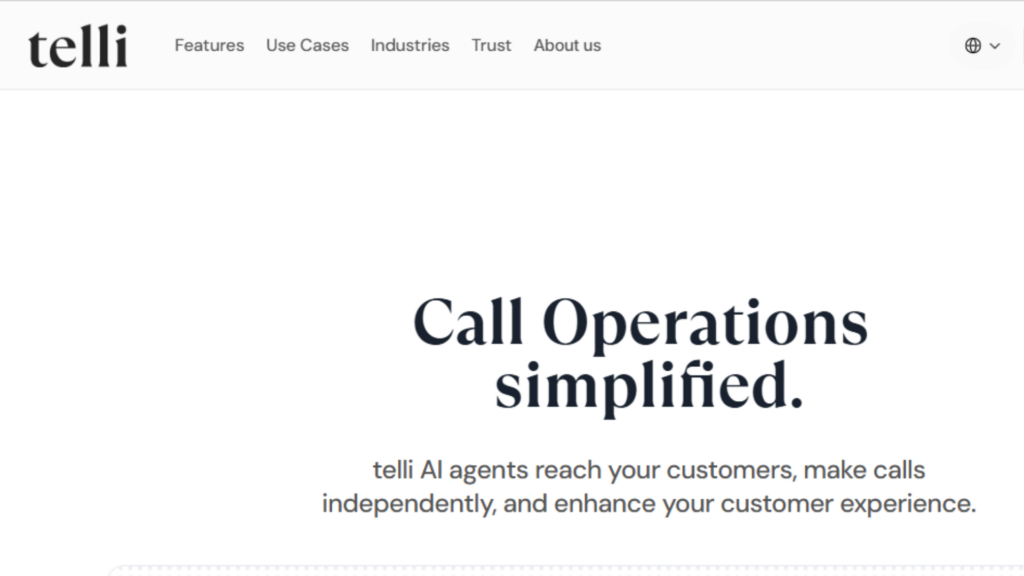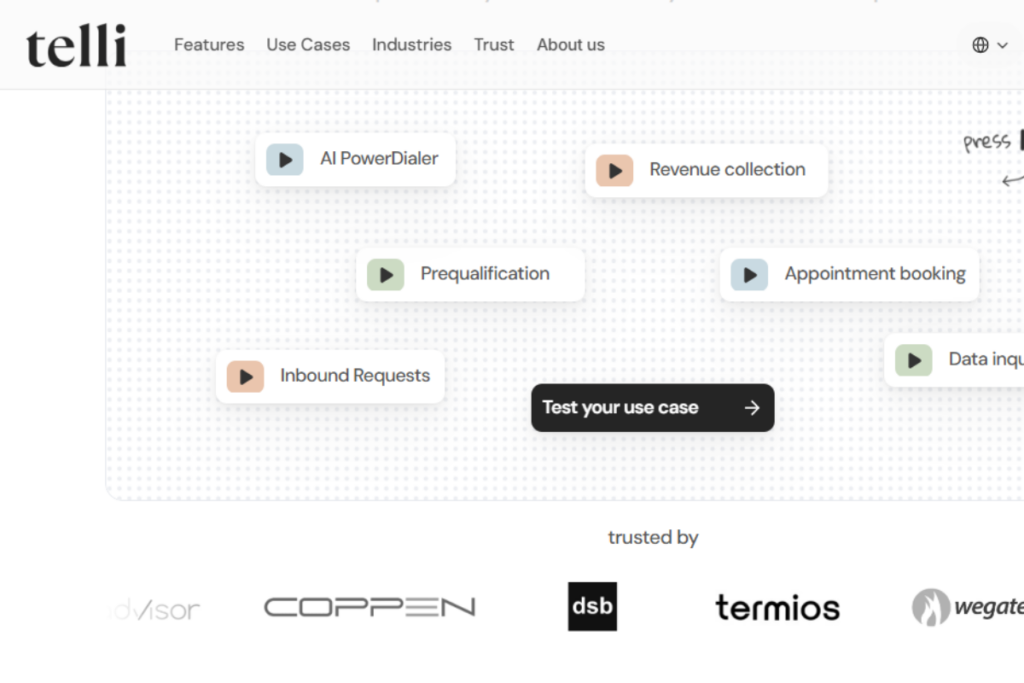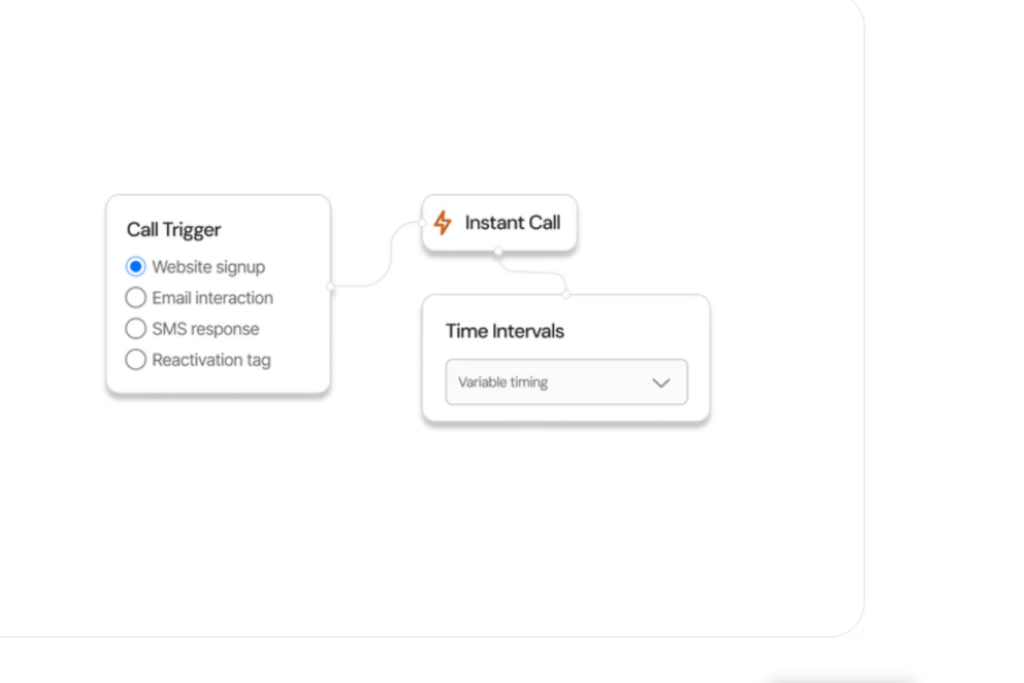Handling customer communication efficiently is a common challenge for businesses. Missed opportunities and ineffective processes often lead to reduced satisfaction and lower engagement. Having faced these issues, I understand the importance of solutions that streamline interactions.
Telli is an AI-powered platform that simplifies and automates customer calls. Its features, such as real-time call routing and data-driven insights, help businesses improve efficiency and manage interactions with precision.

The platform also integrates with existing systems. Thus, it become a valuable tool for businesses aiming to optimize their processes. This review will break down Telli’s key features, practical applications, and measurable benefits.
Whether you’re exploring ways to improve customer engagement or boost operational productivity, this analysis will help you determine if Telli aligns with your business needs.
What is Telli?

Telli is an AI-powered call automation platform that helps businesses manage customer interactions efficiently. It automates call routing, follow-ups, and reminders, enabling organizations to handle communication processes seamlessly.
However, Telli also provides real-time insights through data analysis. With integrations into popular customer management systems, it ensures communication data remains accessible and organized.
Core Functionality and Purpose
Telli focuses on automating and simplifying call management. It uses artificial intelligence to handle repetitive tasks, analyze call data, and assist in real-time decision-making. The tool is designed to reduce the need for manual intervention, saving time and streamlining operations.
Its integration capabilities allow businesses to maintain all their communication data in one place, improving workflow and efficiency. From routine calls to analyzing trends, Telli ensures smoother and faster operations.
Who Is Telli Designed For?
Telli caters to a variety of users across industries and business sizes, including:
- Small and Medium-Sized Businesses (SMBs): Telli provides automation to improve call handling without significant investment for businesses managing limited resources.
- Large Enterprises: Organizations handling high call volumes benefit from its scalable features and in-depth analytics.
- Industries: It is particularly effective for retail, healthcare, customer support, e-commerce, real estate, and financial services.
- Users: Customer service teams, sales professionals, and operations managers rely on Telli to improve productivity and streamline communication.
Unique Features and Benefits
Telli offers several key features that make it a valuable tool for businesses:
- AI-Driven Call Management: Automatically directs calls to the appropriate team, reducing delays and improving response times.
- Actionable Analytics: Provides data insights to optimize communication strategies and identify improvement areas.
- Seamless Integration: Connects with existing customer management tools, simplifying data access and synchronization.
- Scalability: Adapts to the requirements of both small businesses and large organizations.
- Time-Saving Automation: Reduces repetitive tasks, allowing teams to focus on high-priority responsibilities.
Telli empowers businesses to improve customer engagement and operational efficiency through its intelligent automation and user-friendly design. It is a reliable solution for modern communication challenges, offering practical tools to optimize processes and achieve measurable results.
Telli Pros and Cons
Telli provides valuable features for businesses seeking efficient call automation. Here’s a balanced overview of its strengths and limitations:
Pros
- Smart Call Routing: AI-driven technology helps direct calls to the correct department or agent quickly, leading to smoother customer interactions.
- Insightful Analytics: The platform offers detailed performance data, helping businesses improve communication strategies.
- Integration Capabilities: Connects with commonly used CRM systems, making organizing and managing communication easier.
- Scalable Solution: Works effectively for smaller and larger teams handling higher call volumes.
- Efficiency Gains: Automates repetitive tasks, saving both time and operational expenses.
Cons
- Learning Challenges: Users new to similar tools may take time to understand and utilize the platform’s features without full support.
- Customization Gaps: Businesses with particular needs may find limited options for personalizing the tool.
- Cost Considerations: Pricing might feel higher for startups or smaller businesses with limited budgets.
Telli is a reliable option for organizations aiming to streamline call management, but it is essential to evaluate its fit based on specific needs and resources.
Telli Expert Opinion & Deep Dive
In my experience, Telli stands apart in call automation tools by offering a blend of simplicity and advanced features. It suits businesses that need efficient call handling without overloading their teams with unnecessary complexities.
Unlike other tools, Telli distinguishes itself through intelligent call routing and comprehensive analytics, setting it apart from more conventional systems.
Standout Features
Telli’s dynamic call routing powered by AI is one of its most substantial aspects. For example, during periods of increased call traffic, such as a promotional event or seasonal rush, the platform helps allocate calls to the most appropriate teams, reducing wait times and improving overall service levels.
Another highlight is its ability to integrate seamlessly with CRM platforms. This feature allows businesses to keep customer interaction records organized and accessible, critical for service-driven industries like healthcare and e-commerce.
The platform’s scalability adds to its appeal, making it equally useful for smaller operations and large organizations handling extensive customer interactions.
Areas for Improvement
There are areas where Telli has limitations. Its pricing structure may concern businesses operating on a restricted budget, as the tool is better suited to those with the resources to invest in higher-tier solutions.
Additionally, though feature-rich, the interface might take time for new users to learn. Users may struggle to access its full potential without proper onboarding or training.
Customization is another aspect that Telli could expand on. For businesses with highly specific or niche requirements, the tool may lack the flexibility to align with their needs fully.
Best Fit vs. Less Suitable Scenarios
Telli is well-suited for organizations with high call volumes and a focus on optimizing customer service. For instance, a retail company preparing for holiday sales can use Telli to prioritize and manage incoming calls efficiently, helping staff focus on key customer needs while reducing response delays.
Conversely, small teams or startups with limited budgets might find Telli more advanced than their immediate requirements. In such cases, simpler tools might be more practical.
Real-World Scenario
Consider a property management company handling tenant inquiries and maintenance requests. With Telli, calls can be routed based on the nature of the issue—directing maintenance concerns to repair teams and lease inquiries to property managers.
This segmentation improves resolution times and enhances tenant satisfaction. Additionally, data from Telli’s analytics helps identify recurring issues, allowing the company to make informed adjustments.
Telli is a strong contender in the call automation space, offering intelligent features for businesses ready to improve their communication workflows. While it may not suit every scenario, its capabilities make it a valuable tool for organizations focused on scaling their customer service and operational efficiency.
Telli Key Features
Telli offers well-rounded features to simplify call management and enhance customer interactions. Below is a detailed breakdown of its core functionalities and their benefits.
1. AI-Powered Call Routing

Telli employs artificial intelligence to route calls intelligently based on the nature of the inquiry and the availability of agents. This system reduces wait times and ensures customers are directed to the appropriate team or representative. It significantly improves efficiency during periods of high call traffic.
Personal Insight: The ability to dynamically handle call distribution is a significant advantage for businesses with diverse customer service needs.
2. Real-Time Call Insights

The platform provides live data analytics, offering a detailed view of call durations, response times, and resolution rates. These insights help businesses fine-tune their customer service strategies and identify improvement opportunities.
Value: Teams can use this data to refine processes, address inefficiencies, and improve performance.
3. CRM Integration
Telli connects seamlessly with widely used CRM systems, consolidating all communication data into one central location. This feature makes workflows easier and provides easy access to customer histories, particularly useful for industries like healthcare or sales.
Observation: This integration removes redundancies and improves operational accuracy, saving time and effort.
4. Flexible for Business Growth
The platform supports both small-scale operations and large enterprises, adapting to different call volume levels. Its infrastructure is designed to accommodate growing businesses without compromising performance or reliability.
Insight: Investing in a tool that scales with the organization is a forward-thinking approach for businesses planning for future growth.
5. Automated Communication Tools
Telli automates tasks like follow-up calls and reminders, ensuring no customer inquiries are missed. This feature keeps communication consistent and reduces the workload on customer service teams.
Why It Matters: Automating routine activities allows teams to emphasize more impactful tasks, improving productivity.
6. Customizable Call Workflows
The platform offers flexibility in designing call flows, such as prioritizing urgent inquiries or creating multi-step routing systems. These workflows align with specific operational goals and improve the overall call-handling process.
Benefit: This adaptability makes it easier for businesses to create processes that reflect their unique requirements.
7. Focus on Data Security

Telli employs strong encryption methods to protect customer interactions and sensitive information. The platform follows the industry standards for data protection. Thus, it become a reliable choice for organizations with high-security needs.
Takeaway: Secure communication builds customer trust, which is crucial for sectors like finance and healthcare.
8. Simplified User Interface
Telli’s design prioritizes ease of use, enabling teams to manage calls effectively with minimal training. The intuitive interface allows users to understand and apply its features quickly.
Observation: A straightforward interface reduces onboarding time and makes it accessible to teams with varying levels of technical proficiency.
Telli Pricing
Telli offers a structured pricing model designed for various business sizes and needs. While exact pricing details are typically provided upon inquiry, here’s a general outline of what to expect:
- Free Trial: A trial period allows businesses to explore the platform’s features and assess how well it fits into their operations before making a financial commitment.
- Subscription Plans: Telli offers tiered plans that vary based on factors such as the number of users, call volumes, and the inclusion of advanced features like analytics and integrations. These plans cater to startups, mid-sized companies, and large enterprises.
Considerations for Pricing
The pricing might be higher for smaller businesses or startups with limited resources than simpler solutions. Organizations with modest call-handling needs might find it more practical to opt for tools that offer basic functionality at a lower cost.
Telli Use Cases

Telli is a strong choice for businesses where phone-based interactions are central to operations. It supports a variety of industries by streamlining call management and improving customer engagement. Some typical use cases include:
- Customer Support Centers: Businesses with significant call volumes, such as e-commerce platforms or service providers, benefit from automated routing and follow-ups that improve efficiency and reduce wait times.
- Healthcare Services: Clinics and hospitals can use Telli to securely manage patient inquiries and appointment scheduling while maintaining efficient communication.
- Sales-Oriented Teams: Real estate agencies, financial services, and other sales-driven industries use the platform to ensure all leads are managed effectively, minimizing missed opportunities.
- Retail Companies: During peak periods like sales or holiday seasons, Telli supports efficient call handling to enhance customer satisfaction.
Telli Support
Telli aims to simplify call management while offering accessible support to help users make the most of its features. Below is an analysis of its interface, onboarding experience, and customer support.
User Interface and Onboarding
The platform provides a straightforward interface that organizes features clearly, allowing users to access tools easily. Basic functionalities are easy to understand, but those exploring more advanced options, such as analytics or custom call flows, might encounter a slight adjustment period.
The onboarding process includes clear step-by-step guidance and helpful tutorials. These resources are effective for new users, though businesses with limited technical experience may benefit from live training or more interactive onboarding options.
Customer Support Quality
Telli provides multiple channels to assist users:
- Support Channels: You can reach out to the platform via email, live chat, or a support portal, offering flexibility for different preferences.
- Response Times: Feedback indicates timely responses, with most issues resolved efficiently.
- Resource Library: A comprehensive knowledge base includes guides, FAQs, and video tutorials, allowing users to find solutions independently when needed.
Potential Improvements
Businesses with unique requirements may find greater value in personalized training or more in-depth assistance. Expanding support to include additional languages could make the platform more appealing.
Telli offers an accessible user experience and responsive support, helping businesses of various sizes implement the platform effectively. While some users may need more guidance with advanced features, the available resources and support channels ensure a reliable experience overall.
Telli Integrations
Telli offers extensive integration options that allow businesses to connect it with their existing tools and platforms. These integrations simplify workflows and improve operational efficiency, making the platform adaptable to various industries.
Key Integration Features
Telli works with several popular systems, including:
- CRM Platforms: Integration with tools like Salesforce, HubSpot, and Zoho allows businesses to store and access customer interaction data in a single location. This connection helps teams manage leads, track communications, and analyze customer behavior more efficiently.
- Communication and Collaboration Tools: Telli connects with platforms like Slack and Microsoft Teams, ensuring team members receive updates and coordinate effectively, even during periods of high activity.
- APIs for Customization: For businesses with unique needs, Telli provides APIs that enable the creation of custom integrations, ensuring the platform aligns with specific operational requirements.
Workflow Improvements
Integrating Telli with existing systems helps eliminate repetitive tasks and reduces manual data entry.
For example, connecting Telli to a CRM allows automatic syncing of call data, keeping records accurate and up to date. These automated processes save time and improve team productivity.
Compatibility Across Devices and Systems
Telli is accessible on various devices and operating systems, including Windows, macOS, Android, and iOS. This flexibility allows teams to manage calls from desktops, laptops, notepads and mobile devices, whether in the office or remotely.
The browser-based interface further enhances accessibility, ensuring users can operate the platform with minimal restrictions. Telli’s integration capabilities and device compatibility make it a practical business solution.
By connecting easily with other tools and operating on multiple platforms, Telli provides the flexibility needed for efficient and effective operations.
Telli FAQs
1. What pricing plans are available for Telli?
Telli offers subscription plans based on the number of users and required features. Businesses can also try the platform for free to explore it before subscribing.
2. What integrations does Telli support?
Telli integrates with tools like Salesforce, HubSpot, Zoho, Slack, and Microsoft Teams. It also supports API connections for custom integrations to meet specific needs.
3. What features does Telli provide?
Telli includes AI-driven call routing, real-time analytics, automated follow-ups, CRM integration, and secure call handling. These features streamline call management and improve efficiency.
4. Is Telli suitable for small businesses?
Telli works for businesses of any size. It is beneficial for small businesses that handle significant call volumes and want to improve communication processes.
5. What support options are offered by Telli?
Telli provides email and live chat support and a resource library featuring guides, FAQs, and tutorials. Most issues are resolved quickly to minimize disruptions.
6. Can Telli be used on mobile devices?
Yes, Telli is compatible with Windows, macOS, Android, and iOS. Its browser-based interface also allows access from any device with an internet connection.
Telli Alternatives
Below is a comparison of Telli and its alternatives, focusing on features, differences, and suitability:
| Tool | Features | How It Differs from Telli | Best Fit For |
|---|---|---|---|
| Phonely AI | Call automation, IVR, basic analytics | Offers simpler features for smaller businesses | Startups or small teams needing basic automation |
| Retell AI | Call transcription, sentiment analysis | Focuses on analyzing calls post-interaction | Teams prioritizing transcription and sentiment data |
| Vocode | AI call agents, conversational AI | Specializes in natural conversational AI for calls | Businesses requiring advanced virtual agents |
| Speechmatics | Speech-to-text services | Provides transcription without call management tools | Organizations focused on transcription accuracy |
| Deepgram | Real-time transcription and analytics | Centers on voice-to-text and data analysis | Tech-driven teams focusing on voice data insights |
| Goodcall AI | Call routing, scheduling, automation | Emphasizes scheduling features alongside call handling | Small to mid-sized businesses with scheduling needs |
| Regal AI Phone Agent | Outbound call automation, AI agents | Focuses on outbound communication and automation | Sales-focused teams managing outbound calls |
| RimeAI | Call management, AI routing, voice interaction | Offers a stronger emphasis on voice-centric solutions | Large enterprises managing complex voice workflows |
| TalkStack AI | Call queue management, routing, analytics | Optimizes queue handling for support teams | Customer support teams with heavy call volumes |
| Vapi | Voice API integrations | Serves as a backend for custom voice applications | Developers building custom communication systems |
The alternatives to Telli cater to diverse business needs. Phonely AI and Goodcall AI provide simplified solutions for small teams, while tools like Regal AI Phone Agent and Vocode specialize in conversational AI and outbound automation.
Speechmatics and Deepgram stand out for transcription and analytics, appealing to data-focused businesses. RimeAI and TalkStack AI offer advanced routing and queue management, making them suitable for enterprises and high-volume support teams.
Vapi focuses on developers needing flexible APIs for custom solutions. Each tool offers unique capabilities.
Summary of Telli
Telli, founded in 2024, is an AI-driven call automation platform based in Berlin, Germany. The company was co-founded by Finn Zur Muhlen, Philipp Baumanns, and Seb Hapte-selassie and raised $500,000 in seed funding from Y Combinator.
The platform supports industries such as solar, insurance, real estate, and healthcare by automating customer interactions. Its features include smart calling strategies, multi-language capabilities, appointment scheduling, and call data analysis at scale.
Telli enables businesses to streamline processes, improving collaboration between AI and human employees. It is widely used by organizations in energy, medical supplies, and home services to optimize customer engagement and operational efficiency.
Conclusion
Telli offers a strong solution for automating call management with features like AI-driven routing, real-time analytics, and integration with widely used platforms.
Its ability to scale and cater to industries such as healthcare, education, real estate, and customer service makes it valuable for businesses handling high call volumes. Some users may find the learning curve and pricing challenging, but the platform provides significant value for organizations focused on improving efficiency.
We recommend Telli for businesses aiming to streamline their communication processes and boost team productivity. Smaller organizations or startups can use the free trial to evaluate its suitability.
If you’re exploring call automation tools, Telli is worth considering. We encourage you to try the platform, share your experiences, and help others learn how it can support their needs.